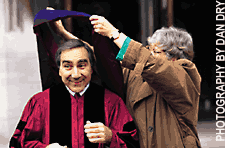Is
there a U of C story that you tell, something that sums up the
University for you?
There are
experiences that happen over and over again that I connect with
the unique sound of Chicago. They could only happen here. They
were most stunning when I first started to experience them,
but they keep going on.
In my first
week, Beth and I ordered a pizza from the Medici. I gave my
name as Sunshine, which is a thing that my father did--easier
to spell. When I went to pick it up, the young woman who gave
it to me said, "Sunshine. Oh, you're Mr. Sonnenschein. You're
the new president!"
She told
me that she was a second-year in the College, and I asked, "What's
your concentration?" She said, "Art history," and I asked, "How
do you find it?"
Then she
looked at me very keenly, put her face almost in mine, and said,
"Brutal!" I jumped back, and as I did, she smiled and said,
"Exactly as it should be."
It was
wonderful. That interchange was pure University of Chicago.
Most recently,
I experienced a very different kind of Chicago story, one that
is telling in a different way. Just a few weeks ago, I attended
the memorial service for Edward Levi. It was a wonderful commemoration
of an important life--most of which was spent right here in
Hyde Park. Edward was a graduate of the Lab Schools, the College,
and the Law School; he was a faculty member, a dean of the Law
School, our provost, and president. Edward was also known outside
the University for his integrity, his brilliance, and his unerring
good judgment-so much so that President Gerald Ford asked him,
at a most troubled time in our nation's history, to serve as
Attorney General.
During
the memorial service, many speakers came to honor and remember
Edward. They consistently spoke about his integrity, his intellect,
and his love for his family and for our University. But the
words that struck me most, amid all of these wonderful stories,
were words that the rabbi quoted from Edward's sons. They said
that their father was not only their very own professor, but
that he was also their very own faculty.
 |
| October
1993 Minutes
before the inaugural procession, Sonnenschein's hooded. |
I have
replayed these words in my mind since the memorial, recalling
how committed Edward was to education as a noble, moral, and
aesthetic enterprise, and remembering how firmly he believed
that liberal learning was relevant to life and its myriad choices,
including the choices of citizens and leaders. For me, and especially
for those who knew him well, these words capture an important
part of what made Edward Levi so delightful, as a father, colleague,
and teacher. But for the University, these words demonstrate
something else as well. They demonstrate for us, quite vividly,
what is so powerful about a Chicago education. They remind us
of what becomes possible when a person of great intellectual
gifts and high ideals undertakes a rigorous liberal education.
Edward
Levi was the ideal University of Chicago graduate. He had read
so widely and thought so deeply about so many matters that to
his own sons--and to his students and his colleagues as well,
I am sure--he was not a professor but a faculty. Indeed,
Edward was a faculty to his colleagues at the Justice Department,
and to the entire nation. What a wonderful testament to the
enduring power of a great liberal education, experienced fully
in youth and revisited across a lifetime.
On a lighter
note, four or five years ago, I found myself asked to speak
to the football team before a game. Now you think of the presidents
at other universities going in and saying, "Okay, guys, do a
great job!" Instead, I read from Henry V at the Battle
of Agincourt. What's appropriate is different.
So my Chicago
stories are really "only at Chicago" stories. The ones that
are most delicious, the ones that seem to represent what we
are at our best, are the ones that both recognize this as a
deep and serious place and are proudly joyful in that recognition.
What
advice would you give Don Randel as he assumes the University's
presidency?
Don brings
many outstanding qualities to the University--he has both depth
and breadth of experience, and he understands very well the
institution's values and ideals. He has a temperament that balances
idealism and pragmatism. As for advice, I will advise when asked,
and be silent otherwise.
What
are the major issues facing higher education in general and the
University of Chicago in particular?
Since what
the University of Chicago does is to provide the best example
of what great universities should be, for us the need--and the
opportunity--to provide leadership is exceptionally important.
We're about
solving classic problems, solving them in new ways, discovering
new problems, and preparing young people for a life of thinking,
sometimes of scholarship. Universities don't make good finishing
schools or social clubs. Nor are they institutions of social
action. They don't serve when they swerve from their most serious
purpose.
Universities
need to concentrate on what they should be about and to help
the public understand their mission and their purpose. I think
that, for us, holding onto our core values, reinforcing them,
and resisting the forces that are pushing us to compromise them--these
are the major issues. At the same time, we must continue to
represent excellence in all that we do. I am confident that
we will do very well.

![]()

